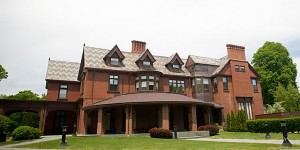By Albert Vuoso,
Mosaic Staff Writer-
With only one month left until the 2012 Presidential Election, The Pell Center hosted a foreign policy debate in the Young Building on October 3. The debate featured Michael Auslin, a columnist for the wall street journal, and Michael Cohen, writer and commentator on American politics and U.S foreign policy.Auslin was first to take the stage, addressing the idea that Americans value security, freedom and prosperity. Without any hesitation, Auslin admitted that neither political party has the best Foreign Policy plans.
According to Auslin, this raises serious concerns for the country for three major reasons: The rise of authoritarianism across seas, self marginalization, and the decline of the U.S from within. Auslin states, “Weakness at home leads to weakness abroad.”
Although Auslin says that neither party is fully capable of handling national security, he is in favor of Romney’s reverse defense cuts to build a stronger defense system in this “dangerous world”.
Cohen held a slightly different opinion. Disagreeing with Auslin, he said that the world is the safest it has been in nearly 60 years, stating there hasn’t been a power struggle since the Cold War.
Cohen states that Republicans were once critical of Obama and his expertise in National Security. However, with the killing of Bin Laden and getting the troops out of Iraq, Obama has proven his effectiveness in the field.
Cohen believes that Obama has the potential to transform Foreign Policy. With rising trust from citizens, Obama will have support to push ahead with ideas he believes in.
Cohen believes that Americans prefer a foreign policy plan in which the U.S. is not responsible for all international issues. Cohen states, “Our ability to make the world a better place is exceedingly limited.”
Yet, he believes that as a country, the U.S. has failed to understand this.
After the lectures ended, Jim Ludes, executive director of the Pell Center, performed an electronic survey, which generated its information from the audience via interactive clickers. Questions such as, “who will you be voting for in the upcoming election?”, “who do you trust with the economy, education, and health care?” were asked. The majority vote went to Barack Obama for the questions above.
Refreshments were served and the presidential debate was aired live.















